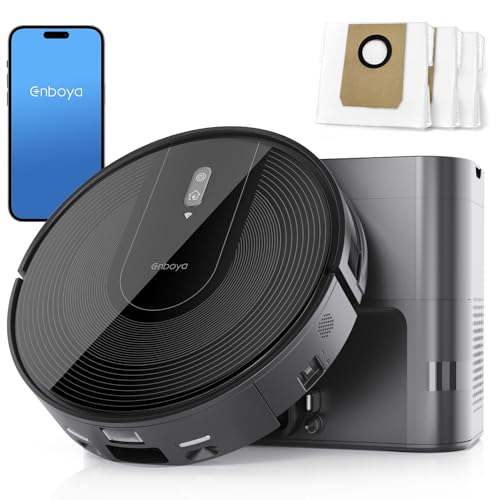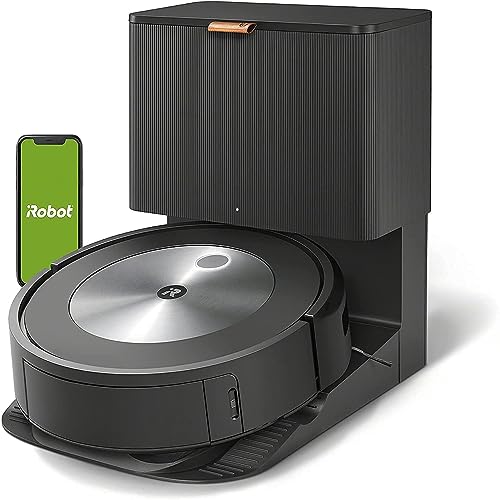You'll Never Guess This Self Emptying Robot Vacuum Mop's Benefits
페이지 정보
작성자 Hermine 댓글 0건 조회 103회 작성일 24-09-05 09:59본문
 self emptying robot vacuum mop (http://www.annunciogratis.net/author/denimatom90)
self emptying robot vacuum mop (http://www.annunciogratis.net/author/denimatom90)The less you need to do with your robot vacuum or mop, the better. With a self-emptying robotic you'll never have to worry about the problem of a full bin.
 A robot that self-empties its base also has a bigger water tank and can automatically wash and dry its mop pads. This fixes one of the most common complaints we've received regarding other models.
A robot that self-empties its base also has a bigger water tank and can automatically wash and dry its mop pads. This fixes one of the most common complaints we've received regarding other models.What is a Self-Emptying Robotic Vacuum?
A typical robot vacuum has an internal storage system in which it accumulates dust and other debris during cleaning. You may need to empty the bin every 2 or 3 cleaning cycles, depending on the size of your house and the amount of dirt. A self-emptying vacuum will do the job for you, dumping debris into a larger bin at its docking station. The bin usually has an air filter that captures and removes fine dust particles before they release into the air. This will stop the dustbin from getting full and becoming clogged. This can cause the vacuum cleaner to smell or stop working properly.
The OMNI station also prepares the robot for the next cleaning cycle. It charges the robot cleans the brush roll and automatically washes and refills mopping pads. It also empties the dust bin that is onboard and then replaces the bag ensuring that it is ready for the next cleaning session.
This is a significant time saver, particularly for busy households. This also decreases the possibility that your best budget robot vacuum with self empty vacuum could accidentally release dust clumps into the air. This could be a problem for families suffering from allergies or asthma.
Self-emptying robotic vacuums are more expensive than those without this feature, but the price is offset by the time and money you can save. You will also need fewer cleaning sessions since you will not have to clean a dirty bin between uses.
A self-emptying robot system can produce noise when emptying. The noise can last for up to a minute, and it can be more loud than any other noise made by the best robot vacuum and mop self empty itself during cleaning. The noise may disturb some people, and certain models have different settings and DND modes that can lower the volume.
If you're looking to reduce this noise, consider investing in a model that has apps that integrate and can be stopped. This will allow you to control the robot with tablets or smartphones, scheduling cleaning sessions, setting no-go zones, observing the robot's movements and altering settings like suction power.
Self-Emptying Robot Vacuums Make More In a Larger Homes
Robot vacuums are excellent in cleaning floors, but they can't get into those difficult corners and crevices. When they run into an obstruction, it could cause the vacuum to get stuck or even fall over. The Samsung Jet Bot+, for example is equipped with a special fiber that is attached to its brushroll to aid in keeping these obstacles at bay. It also has an intelligent power control that adjusts suction for different types of flooring and five-stage HEPA filter to trap dust particles and allergens.
The Jet Bot+ is a great option for homeowners who live in homes with a mix of carpets and rugs, or empty floors. However the Jet Bot+ does not include a self-emptying function. The feature is offered on other robot vacuums that offer more robust cleaning performance for less money.
Most self-emptying robot vacuums feature tiny dust bins that need to be manually emptied at the end of each cleaning cycle. This can be irritating and is particularly so in larger homes where dust tends to build up fast.
Some models come with a dual-purpose dustbin, which can be used to store dirt as well as water to mop. However, you might still need empty it manually after each use. These two-in-one dustbins also tend to be smaller than the standalone versions, so you'll probably be filling them more frequently.
If you're in search of a self-emptying robot vacuum, look for one with the capacity to hold a lot and has minimal maintenance requirements. This will help you save time and stress when emptying the robot, and allow you to make use of it to clean.
The iRobot Combo j7+ is easy to maintain and comes with an enormous storage capacity. Its app lets you customize the settings for both mopping and mopping, including the setting of no-mop zones as well as scheduling. You can also alter the mopping pad when it's dirty, change the amount of water dispensed in cleaning mode and even create invisible walls that prevent the robot from entering certain areas. The app can be used to control the navigation and mapping functions of the robot, but it takes longer to complete than other models.
Self-Emptying Robot Vacuums are an excellent investment
While robot vacuum and mop self empty vacuums aren't able to take on all the tasks or replace an upright stick vacuum, canister, or canister, they can save you time and help keep dust and dirt from accumulating in your home. Self-emptying models are especially beneficial. They typically suck the debris into their docking stations and store it in a bag that only needs to be changed every 60 days or so. The fact that they don't reintroduce dust back to your home, means you'll need to deal with it less frequently, which can be helpful when you have people in your home who are sensitive to allergies or respiratory issues.
If you purchase a self-emptying robotic vacuum and you'll also be getting additional convenience features that make the product more worthwhile, such as set run times and automatic and mapping capabilities, mop and vacuum switching features and smart home connectivity (which allows you to control your robot vacuum with voice assistants such as Alexa). You might not require all of these features however they are a great addition.
The main benefit of a self-emptying robotic vacuum is the way it makes cleaning your home easier. If you have a large home and you regularly clean it, you don't need to be concerned about emptying the robot vacuum's dust bin between runs. If you have smaller space, it's still nice to not be required to clean the bin that is soiled after each time you vacuum.
In terms of cleaning, most robot vacuums that self-empty employ a method of vacuuming called "power suction," in which a powerful current is used to pull debris into the base. You should think about whether the vacuuming will be a problem for your home.
Look into the DreameBot L20 Ultra if you're looking for self-emptying machines that also has the ability to mop. It can clean its mop pad and fill its reservoir of water among other things. It's not equipped with the sophisticated AI-powered obstacle avoidance of some of the other self-emptying vacuums listed on this list however it's a great choice for homes with a lot of space.
Self-Emptying Robotic Vacuums Help you avoid dusty bins
When looking for a robot cleaner you should look for models with dustbins that are automatically emptied when the robot returns to its base. This means you don't have to empty a small dustbin several times during each cleaning session. It also ensures that your robot is always ready for the next round. This feature is essential for busy homeowners, especially those who have large homes.
The bases that self-empty also reduce the amount of time you need to spend scrubbing the robot's mopping pad between cleaning sessions. This is a labor-intensive task that can be very frustrating but it's essential for the long-term health of the pads of your robot. Many robot mops that feature self-emptying bases come with an automatic dryer and washing feature. This simplifies the process and quicker.
The most effective self-emptying robotic vacuums come with large dustbins that can store dirt and other debris for up to 60 days. This means you only need to empty them every two months or at least every two months or. This is a significant improvement over basic robot vacuums that fill their bins with dust in a couple of weeks, requiring you to empty them much more often.
If you don't want spend the extra money for self-emptying robot vacuums, you could consider setting up a routine that will have your robot vacuum clean one area or room in your home at a time instead cleaning the entire house. This will stop the robot from sweeping the same space over and over which is not good for your floors and furniture's long-term health.
Some models can detect and avoid specific areas such as pet water bowls, spilled cereal or electronic fences with virtual boundaries built into the robot's application. This is a great feature if you have pets and children who are prone to spilling liquids onto your floor.
A self-emptying robot vacuum or mop is a useful feature however it's not necessary for people who don't have a very messy home. That's because the most important characteristics of a robot vacuum are strong suction power and a wide cleaning path that can efficiently pick up all of the dirt, dust and pet hair from the floor surfaces of your home.
댓글목록
등록된 댓글이 없습니다.